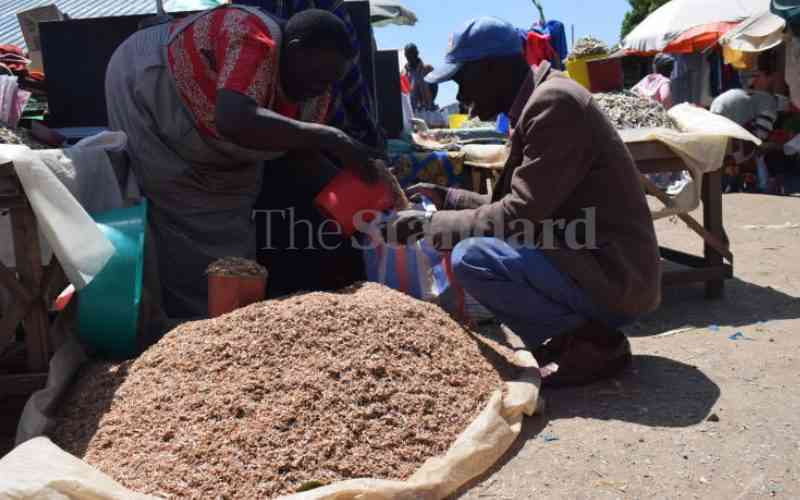
Business is booming for fishermen and traders along Lake Victoria in Kisumu who have found an alternative source of income from selling tiny, bright red critters known locally as ochong'a.
Ochong'a, or freshwater shrimp are part of the larger group of crustaceans which live in fresh water.
One of the most popular varieties is the red cherry shrimp. These are bright, cherry red in colour and tiny, only reaching around one and a half inches in length when fully grown.
The shrimp are caught alongside silver cyprinid or Lake Victoria sardines, locally known as omena.
Bony Sidika, a fisherman at Kinda Beach in Suba sub-county, says fishermen who catch omena end up catching freshwater shrimp in their nets as well.
For many years now, the crustaceans would be discarded or tossed back into the lake as they were perceived to be of no economic or nutritional value, especially since the small varieties are inedible by humans.
However recently, many fishermen around the lake have begun stocking up on shrimp which they say is a profitable source of income.
After fishing, the shrimp are sorted from omena while still wet, then the two are dried separately under the sun. Once dry, the shrimp are then sold to chicken farmers who use them as poultry feed.
The activity is rapidly taking root in Homa Bay and has turned many lakeside beaches into major market centres for chicken and animal feed.
Traders travel far and wide to buy shrimp from fishermen on the shores of the lake.

"The shrimp are easy to catch because they behave like omena in water," Sidika says, adding that sale of the crustaceans is a good source of employment for many people.
Eunice Ongoro is one such trader who sells freshwater shrimp at Homa Bay Pier market. Ongoro sells the crustaceans in a two-kilogramme container at Sh70.
She says most of her customers are farmers who rear chicken and those who breed fish in ponds.
Shrimp are popular because they are fed directly without having to undergo industrial processing, which is an additional cost.
"Many fish farmers know me as their supplier of freshwater shrimp. The crustaceans are good," Ongoro says.
The freshwater shrimp are not used in the lake region alone; they are also transported to Nakuru and Nairobi for industrial processing into animal feeds.
The feeds are then packaged and sold in various parts of the country as an important protein source for domestic animals.
Sidika says lack of fish processing plants in Kisumu makes fishermen sell the products at very low prices, thus translating into huge losses.
He says for example, a 16kg trough of freshwater shrimp is sold at Sh560 in Homa Bay, but the same is sold at Sh2,800 in Nakuru.
According to Michael Omondi, co-ordinator of the Aquaculture Business Development Programme, a government project for promoting fish farming, freshwater shrimp can be used for human consumption. However, they are not eaten because of local cultural beliefs.
"Freshwater shrimp are rich in protein content. Human beings can eat them but the only obstacle at the moment is our cultural beliefs which forbid it," says Omondi.
 The Standard Group Plc is a multi-media organization with investments in media
platforms spanning newspaper print
operations, television, radio broadcasting, digital and online services. The
Standard Group is recognized as a
leading multi-media house in Kenya with a key influence in matters of national and
international interest.
The Standard Group Plc is a multi-media organization with investments in media
platforms spanning newspaper print
operations, television, radio broadcasting, digital and online services. The
Standard Group is recognized as a
leading multi-media house in Kenya with a key influence in matters of national and
international interest.
